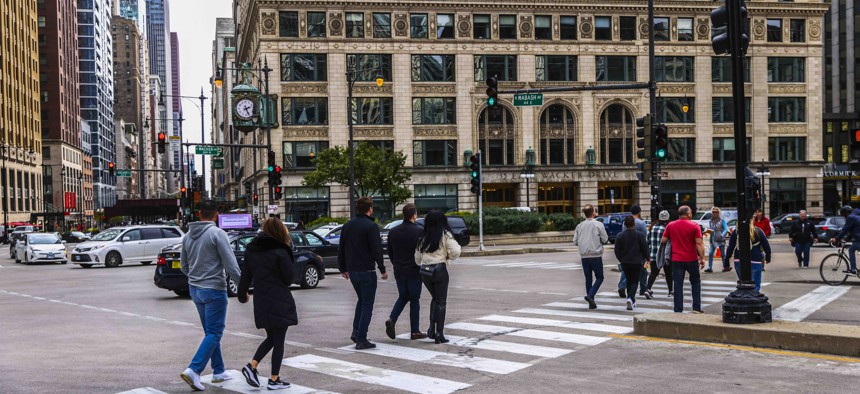Cities Put on Notice to Install Signals to Help Blind Pedestrians Cross Streets

Pedestrian in downtown of Chicago in 2022. Beata Zawrzel/NurPhoto via Getty Images

Connecting state and local government leaders
A federal judge, in a suit supported by the U.S. Department of Justice, recently ruled that Chicago had failed to make intersections safe for people with disabilities. It is the second such ruling against a major city.
Chicago must install devices at thousands of signalized intersections to help blind pedestrians cross safely, a federal judge recently ruled, in a sign that courts and the federal government are taking a harder line with cities that don’t make sidewalks accessible to people with disabilities.
Disability advocates and the U.S. Department of Justice sued Chicago for its lack of accessible pedestrian signals (APS). The city has installed the devices at just three dozen of its 2,800 intersections that have visual signals for walkers. The APS devices use sounds and vibrations to indicate when it’s safe to cross a street.
Disability Rights Advocates, one of the groups that brought the lawsuit, said the paltry number of installations compared to intersections “may be the worst of any major metropolitan area in the United States.” It claimed that the lack of accommodations was a violation of the 1991 Americans with Disabilities Act’s guarantees of equal access to public services for people with disabilities.
Chicago’s lawyers said the city had no obligation to add the features, because blind pedestrians could still use the city’s sidewalks without them. No federal law explicitly requires the city to install APS devices, they argued. (The Chicago Department of Transportation did not respond to a request for comment.)
U.S. District Judge Elaine Bucklo disagreed with the city. Chicago’s “current APS distribution does not provide plaintiffs and the class ‘meaningful access’ to its network of pedestrian signals in violation of the ADA and the Rehabilitation Act. The question of what steps the city must take to remedy its non-compliance is one for another day,” she wrote.
In her ruling, Bucklo relied heavily on a separate case dealing with New York City’s lack of APS devices. There, a federal judge in late 2021 ordered New York to install accessible pedestrian signals at 9,000 intersections within a decade.
Jelena Kolic, a senior staff attorney for Disability Rights Advocates, said the ruling could send a signal to city officials across the nation.
With two of the biggest cities in the country under court order to install APS devices and the Justice Department siding with disability advocates, Kolic said she wouldn’t be surprised if cities take stock of how many of their own intersections are accessible.
“People are more and more on notice that this is an issue to have signalized intersections that are not accessible to people who are blind,” she said. “Every city has a duty to provide a level of access to its pedestrian grid.”
APS devices are usually attached to traffic light posts at intersections. They have a button that activates the audio cues. Many sighted people confuse these buttons with “beg buttons” that activate walk signals. The signals use spoken directions and buzzing sounds to indicate which “walk” signal is on and how long it lasts. A tactile arrow points the way across the street.
Without an APS device, blind pedestrians have to use their own coping mechanisms to try to cross streets safely, but many of those strategies are either dangerous or unreliable.
For example, blind pedestrians often listen for the sound of parallel vehicle traffic to know when it is safe to enter the intersection. But these cars and trucks might be moving forward to turn, which could put the pedestrians in the way of the vehicles.
Vehicle sounds are even more unreliable in places that have incorporated leading pedestrian intervals into their traffic signals. There, pedestrians essentially get a head start on crossing an intersection before vehicles get a green light. That makes it easier for motorists to see the people who are crossing. But without an APS, there’s no way for a blind pedestrian to know when to start crossing. If they wait until vehicles cross, the drivers might not expect them in the intersection and the pedestrian will have less time to cross.
It can also be difficult to find the crosswalk. In some intersections, the curb cut or ramp leads into the middle of the intersection, rather than in the direction of the opposing sidewalk. The arrow attached to the signal, which blind pedestrians can feel with their hands, clarifies which direction to walk.
APS devices have been widely available for decades, but cities like Chicago and New York have been slow to install them.
Bucklo noted the slow progress in her ruling. “Despite 15 years of planning, projections, assurances, and the receipt of federal funds, no more than 30 of the city’s intersections had been equipped with APS by the time briefing on the pending motions had concluded,” the judge noted.
Those long delays have prompted advocates to try a different approach to get the devices installed, Kolic said.
“A lot of [activists] hoped for a very long time that they could advocate, and the public entities would do the right thing,” she said. “They spent years trying to do so. Now they’re saying, it’s time to try litigation. Other strategies have not worked. These lawsuits are showing that it is possible to hold public entities accountable.”
Daniel C. Vock is a senior reporter for Route Fifty based in Washington, D.C.

NEXT STORY: Texas legislators pursue fix to costly law that requires nonexistent election equipment





